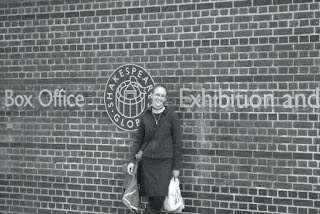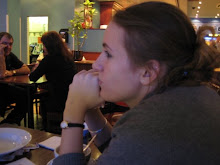I've always been surprised at the frequency with which one seems to get asked about one's favorite season. Personally, I've never really had an answer. I mean, how does one differentiate between hot, hotter, and hottest? Granted, I'm not being completely fair, but most of my life has measured seasonal change in temperature and little else. Even in Oregon the seasons weren't particularly radical. At least, not where I was walking through campus with my head stuck in a mountain of books. Drizzly, rainy, sporadic sunshine. Nothing too exciting.
But here, here I love to watch the seasons change.
Granted, most of winter wasn't particularly spectacular, though there is nothing much lovelier than snow falling in glowing lamplight.
But these days the world is awash with sprinkling petals -- consumed with flowering trees.
And in our college courtyard, I watch a tree, day by day, unfurl tiny, jewel-green leaves, sure I've never seen life bloom so gradually.
But the autumn is definitely how I'll remember Oxford (due, in part, to the reality that it used to be the only way I remebered Oxford and will always be the way I saw it first). The walls of ancient colleges ablaze with flaming vines.
As Virginia Woolf put it, "If the spirit of peace dwells anywhere, it is in the courts and quadrangles of Oxbridge on a fine October morning."
And over it all, a sky that changes day by day, hour by hour. That glows in swimming blues, and yearns in charcoal grays.
To quote Woolf again (from Jacob's Room with some small alterations [and I'll reward anyone who spots them]):
But here, here I love to watch the seasons change.
Granted, most of winter wasn't particularly spectacular, though there is nothing much lovelier than snow falling in glowing lamplight.
But these days the world is awash with sprinkling petals -- consumed with flowering trees.
And in our college courtyard, I watch a tree, day by day, unfurl tiny, jewel-green leaves, sure I've never seen life bloom so gradually.
But the autumn is definitely how I'll remember Oxford (due, in part, to the reality that it used to be the only way I remebered Oxford and will always be the way I saw it first). The walls of ancient colleges ablaze with flaming vines.
As Virginia Woolf put it, "If the spirit of peace dwells anywhere, it is in the courts and quadrangles of Oxbridge on a fine October morning."
And over it all, a sky that changes day by day, hour by hour. That glows in swimming blues, and yearns in charcoal grays.
To quote Woolf again (from Jacob's Room with some small alterations [and I'll reward anyone who spots them]):
They say the sky is the same everywhere. But above Oxford -- anyhow above the roof of Christ Church -- there is a difference. Is it fanciful to suppose the sky, washed into the crevices of Christ Church, lighter, thinner, more sparkling that the sky elsewhere? Does Oxford burn not only into the night, but into the day?What did I do to deserve to live somewhere so spectacularly, hauntingly beautiful?














